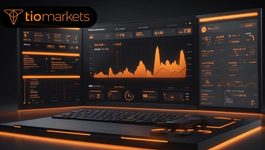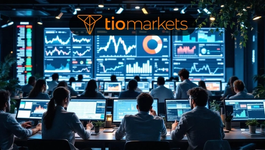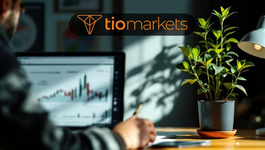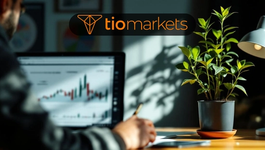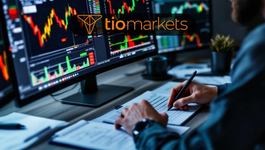What are Commodities?
BY TIOmarkets
|May 16, 2024Commodities play a vital role in our global economy. From agricultural products to energy sources and metals, commodities are essential resources that hold great value. In this article, we will explore the concept of commodities, their types, their significance in the world economy, as well as the opportunities and risks associated with investing in them. We will also dive into emerging trends in commodity markets and examine how technology is shaping the future of this industry.
Understanding the Concept of Commodities
Commodities are tangible goods that are generally uniform in quality and can be exchanged or traded. They can be raw materials, primary products, or natural resources. What sets commodities apart from other goods is that they are interchangeable, meaning that one unit of a particular commodity is similar to any other unit of the same commodity.
Definition and Explanation of Commodities
A commodity is a basic item that is used in commerce and is interchangeable with other commodities of the same type. These goods are primarily used as inputs in the production of other goods or services. Examples of commodities include crude oil, wheat, gold, and natural gas.
Commodities have been traded for centuries, dating back to ancient civilizations. They have played a crucial role in facilitating trade between different regions, as well as enabling economic growth.
The Historical Context of Commodities
Commodity trading has a rich history that spans thousands of years. In ancient times, commodities were traded among civilizations along established trade routes. Spices, for example, were highly valued and often exchanged for precious metals. This early form of commodity trading laid the foundation for the modern global market we have today.
With the advancement of technology and transportation, the trading of commodities has become more efficient and accessible. Today, commodities are traded on various exchanges worldwide, allowing investors and businesses to participate in this dynamic market.
One fascinating aspect of commodity trading is the impact it has on global economies. The prices of commodities can have a significant influence on a country's economic performance. For instance, fluctuations in the price of crude oil can affect the cost of transportation, manufacturing, and ultimately, the price of consumer goods. Governments and businesses closely monitor commodity prices to make informed decisions and develop strategies to mitigate potential risks.
Furthermore, commodities are not only traded by large corporations and investors. Individual traders and small businesses can also participate in commodity markets through various financial instruments, such as futures contracts. These contracts allow traders to speculate on the future price of a commodity, providing opportunities for profit or hedging against price volatility.
Another interesting aspect of commodity trading is the role it plays in global supply chains. Commodities are often sourced from different parts of the world, creating complex networks of producers, intermediaries, and consumers. For example, the production of a smartphone involves the extraction of minerals, such as lithium and cobalt, from mines in different countries, which are then processed and assembled in yet another location. Understanding these intricate supply chains is crucial for businesses to ensure a stable and reliable flow of commodities.
Types of Commodities
Commodities can be categorized into different types based on their characteristics and usage. The three main types of commodities are agricultural commodities, energy commodities, and metal commodities.
Agricultural Commodities
Agricultural commodities include crops like corn, wheat, soybeans, and coffee, as well as livestock such as cattle and hogs. These commodities are vital for feeding the growing population, and their prices are influenced by factors such as weather conditions, global demand, and government policies.
Investing in agricultural commodities provides an opportunity to participate in the global food market. However, it is important to consider the risks associated with factors such as crop diseases, fluctuating demand, and geopolitical events that can impact the prices of these commodities.
Energy Commodities
Energy commodities are resources used to generate power and fuel various industries. Crude oil, natural gas, and coal are the main energy commodities. These commodities are essential for transportation, electricity generation, and manufacturing processes.
Investing in energy commodities offers exposure to the energy sector. However, it is crucial to understand the volatile nature of energy prices, which can be influenced by geopolitical tensions, supply and demand dynamics, as well as environmental regulations and technological advancements.
Metal Commodities
Metal commodities include precious metals like gold, silver, and platinum, as well as industrial metals such as copper, aluminum, and iron ore. Precious metals are often used as investment vehicles and have cultural significance. Industrial metals, on the other hand, are vital for construction, manufacturing, and infrastructure development.
Investing in metal commodities can provide a hedge against inflation and global economic uncertainty. However, it is important to consider factors such as supply and demand dynamics, global economic conditions, and technological advancements that can impact the prices of these commodities.
The Role of Commodities in the Global Economy
Commodities are an integral part of the global economy, influencing various aspects of trade, inflation, and economic growth. Understanding the role they play can provide valuable insights into the dynamics of the market.
Commodities and Trade
Commodities form the backbone of global trade, as they are vital inputs for industries around the world. Countries that have an abundance of certain commodities often export them to generate revenue, while those lacking these resources rely on imports to meet their needs.
International trade in commodities facilitates economic development and helps to ensure a stable supply of essential goods. It also promotes interdependence between nations and fosters economic cooperation.
Commodities and Inflation
Commodities have a significant impact on inflation, as fluctuations in their prices can drive changes in the overall price level of goods and services. Rising commodity prices can lead to higher production costs for businesses, which may then be passed on to consumers through increased prices.
Central banks and policymakers closely monitor commodity prices as part of their efforts to maintain price stability and control inflation. Understanding the relationship between commodities and inflation is crucial for managing economic policy effectively.
Investing in Commodities
Commodities have become an attractive investment option for individuals and institutions looking to diversify their portfolios and hedge against inflation or volatility in other asset classes. However, investing in commodities requires careful consideration of the risks involved.
Benefits of Investing in Commodities
Investing in commodities can provide diversification benefits, as their prices are influenced by different factors compared to traditional assets such as stocks and bonds. They have a low correlation with other asset classes, which means that their prices may move independently of the broader market.
Commodities also serve as a hedge against inflation, as their prices often rise during periods of inflationary pressure. They are tangible assets that can retain value even in uncertain economic conditions.
Risks Associated with Commodity Investments
Commodity investments come with their fair share of risks. Price volatility is one of the key risks, as commodity prices can be influenced by various factors such as global supply and demand dynamics, geopolitical events, and weather conditions.
Investors also need to consider factors such as storage costs, transportation logistics, and currency fluctuations when investing in commodities. Additionally, commodity investments may require specialized knowledge and expertise, as well as monitoring of global market trends.
The Future of Commodities
The world of commodities is constantly evolving, driven by technological advancements, changing consumer preferences, and global economic trends. Understanding the future of commodities is essential for investors and businesses looking to stay ahead of the curve.
Emerging Trends in Commodity Markets
One of the emerging trends in commodity markets is the growing demand for sustainable and ethically sourced commodities. Consumers are increasingly conscious of the environmental and social impact of their purchases, driving the need for transparent and responsible commodity production.
Technological advancements are also shaping the future of commodity markets. The use of blockchain technology, for example, can provide greater transparency and traceability in supply chains, enhancing efficiency and reducing fraud.
The Impact of Technology on Commodities
Technology is revolutionizing the way commodities are produced, traded, and consumed. Automation, robotics, and artificial intelligence are improving efficiency and productivity in mining, agriculture, and energy sectors.
Furthermore, renewable energy technologies are transforming the energy sector, reducing reliance on traditional fossil fuels and creating new opportunities in renewable commodities such as solar panels and wind turbines.
In Conclusion
Commodities are the backbone of our global economy, providing essential resources for industries and facilitating trade between nations. Understanding the concept of commodities, their types, and their role in the global economy is crucial for individuals and businesses looking to navigate this dynamic market.
Investing in commodities can provide diversification benefits and serve as a hedge against inflation, but it also comes with risks that need to be carefully evaluated. Embracing emerging trends and harnessing the power of technology can help to shape the future of commodity markets and contribute to a sustainable and prosperous global economy.
Start Trading Commodities with TIOmarkets
Ready to take the next step in the commodities market? TIOmarkets offers a robust online trading platform where you can trade a variety of commodities, along with Forex, indices, stocks, and futures markets. Benefit from low fees and access over 300 instruments across 5 markets. Join a growing community of 170,000+ traders in over 170 countries who have chosen TIOmarkets for their trading needs. Enhance your trading skills with our comprehensive educational resources and step-by-step guides.
Take action today and Create a Trading Account with TIOmarkets to start your journey into commodity trading.

Risk disclaimer: CFDs are complex instruments and come with a high risk of losing money rapidly due to leverage. You should consider whether you understand how CFDs work and whether you can afford to take the high risk of losing your money. Never deposit more than you are prepared to lose. Professional client’s losses can exceed their deposit. Please see our risk warning policy and seek independent professional advice if you do not fully understand. This information is not directed or intended for distribution to or use by residents of certain countries/jurisdictions including, but not limited to, USA & OFAC. The Company holds the right to alter the aforementioned list of countries at its own discretion.
Join us on social media

Behind every blog post lies the combined experience of the people working at TIOmarkets. We are a team of dedicated industry professionals and financial markets enthusiasts committed to providing you with trading education and financial markets commentary. Our goal is to help empower you with the knowledge you need to trade in the markets effectively.
Related Posts
